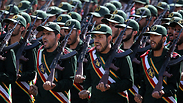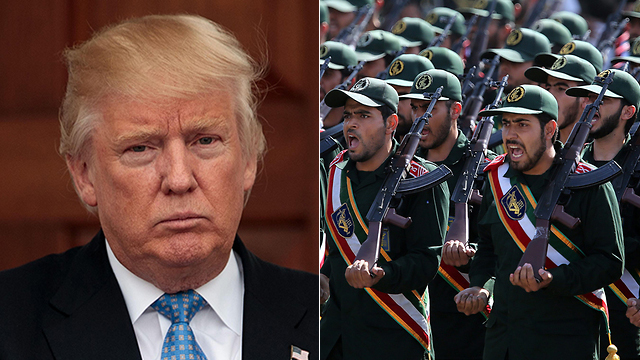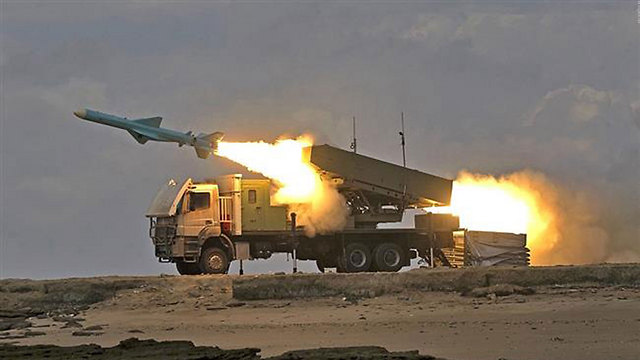

As Trump tightens Iran sanctions, Tehran begins military exercise
Iran's Islamic Revolutionary Guard Corps begins military testing on Saturday, less than 24 hours after Washington issues the first US sanctions on Tehran under newly elected President Trump; 'Iran is playing with fire - they don't appreciate how "kind" President Obama was to them. Not me!' tweets Trump, in response to Iran's ballistic missile testing on Thursday.
Iran's Islamic Revolutionary Guard Corps (IRGC) continued with military testing in North Iran on Saturday, as tensions with US President Donald Trump contrinue to rise. The Trump administration on Friday imposed sanctions on Iran, which it said were just "initial steps" and said Washington would no longer turn a "blind eye" to Iran's hostile actions.
The Iranian exercise will test out ground-to-ground missiles, radar systems and cyber warfare, and follows ballistic missile testing Iran carried out on Thursday. "Iran is playing with fire - they don't appreciate how 'kind' President Obama was to them. Not me!" tweeted US President Donald Trump on Friday. The tweet followed a related message from Thursday, in which he tweeted, "Iran has been formally PUT ON NOTICE for firing a ballistic missile.Should have been thankful for the terrible deal the U.S. made with them!"
Making the his administration's hardening position even clearer, on Friday the US announced that it would be sanctioning 12 Iraninan companies and 13 Iranian individuals, as a response to Iran's testing of ballistic missile launching. These are the first sanctions President Trump has placed on Iran since entering office.
"The Trump Administration will no longer tolerate Iran’s provocations that threaten our interests," National Security Advisor Michael Flynn said. "The days of turning a blind eye to Iran’s hostile and belligerent actions toward the United States and the world community are over."
Suggesting that more concrete action could follow if Iran does not curb its ballistic missile program and continues support in regional proxy conflicts, a senior administration official said the latest sanctions were the initial steps in response to Iran's "provocative behavior."
The White House said that while the sanctions were a reaction to recent events, they had been under consideration before. It added that a landmark 2015 deal to curb Iran's nuclear program was not in the best interest of the United States.
White House spokesman Sean Spicer said the missile test did not violate the nuclear agreement. "It's not a direct violation ... I think there is no question that it violates the spirit of that," Spicer said in an interview with MSNBC. He said the nuclear agreement was a "sweetheart deal" for Iran.
US Senator Mark Warner expressed support for the sanctions, adding, "I urge the Administration to bring clarity to their overall strategy towards Iran, and to refrain from ambiguous rhetoric—or provocative tweets—that will exacerbate efforts to confront those challenges.”
German Foreign Minister Sigmar Gabriel on Friday expressed understanding over the sanctions, but warned against conflating Sunday's test with the nuclear deal.
Iran tweets back
Iran denounced the sanctions as illegal and said it would impose legal restrictions on American individuals and entities helping "regional terrorist groups," state TV quoted a Foreign Ministry statement as saying. In response to the new US sanctions, Iranian Foreign Minister Javad Zarif tweeted "Iran unmoved by threats as we derive security from our people. We'll never initiate war, but we can only rely on our own means of defense."
Citing a foreign ministry statement, Iran's semi-official Fars news agency said the missile program is "the undeniable and inalienable right of our nation under international law and the UN charter. Any foreign interference in this regard is a violation of international law."
The new designations stuck to areas that remain under sanctions even with the 2015 nuclear deal sealed between Iran and world powers in place, such as the IRCG, an elite military body that is powerful in Iranian politics and the economy, and Iran's ballistic missile program. Zarif led Iran's delegation at the nuclear negotiations in 2015.
Meanwhile, the US moved a Navy destroyer, the USS Cole, close to the Bab al-Mandab Strait off the coast of Yemen to protect waterways from Houthi militia aligned with Iran.
Global ramifications for US sanctions on Iran
The sanctions' impact will be more symbolic than practical, especially as they do not affect the lifting of broader US and international sanctions that took place under the nuclear deal. Also, few of the Iranian entities being targeted are likely to have US assets that can be frozen, and US companies, with few exceptions, are barred from doing business with Iran.
Those affected under the sanctions cannot access the US financial system or deal with US companies and are subject to secondary sanctions, meaning foreign companies and individuals are prohibited from dealing with them or risk being blacklisted by the United States.
Among those affected by the sanctions were what it said was a Lebanon-based network run by the Revolutionary Guards.
"The list is actually so targeted and comparatively mild, it leads one to surmise that it may have been a set of targets devised by the Obama administration, and was ready to go when Trump came into office," said Adam Smith, former senior advisor to the Director of the US Treasury Department’s Office of Foreign Assets Control. "As such, the real test for which way the Trump team will go on Iran may well be not this list release but the next one, whenever that occurs," Smith said.
Some of the entities sanctioned by the US Treasury are based in the United Arab Emirates, Lebanon and China. Among those affected were companies, individuals and brokers the US Treasury said support a trade network run by Iranian businessman Abdollah Asgharzadeh: the Treasury said he supported Shahid Hemmat Industrial Group, which the United States has said is a subsidiary of an Iranian entity that runs Iran's ballistic missile program.
Hasan Dehghan Ebrahimi, a Beirut-based official with the Revolutionary Guard's Qods Force, which runs its operations abroad, was put under sanctions for acting on behalf of the Qods Force, Treasury said.
Three Lebanese companies involved in waste collection, pharmaceuticals, and construction were also listed under the sanctions for being owned or controlled by Muhammad Abd-al-Amir Farhat, one of Ebrahimi's employees. The US Treasury said he has facilitated millions of dollars in cash transfers to Lebanese militant group Hezbollah. Two of his employees and a company he manages were also sanctioned. Treasury said Ebrahimi and his employees used a Lebanon-based network to transfer funds, launder money, and conduct business.

















